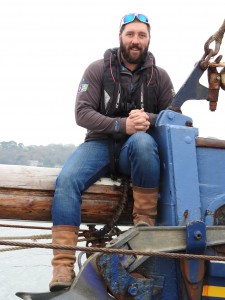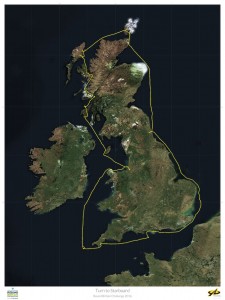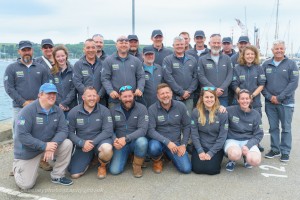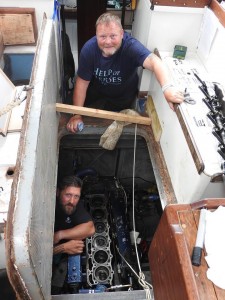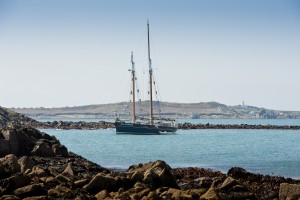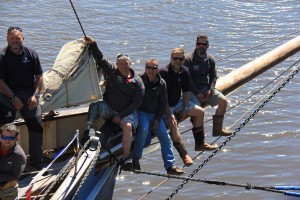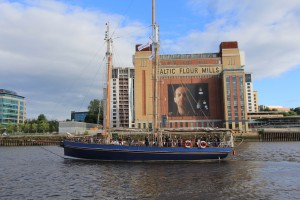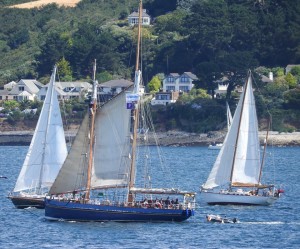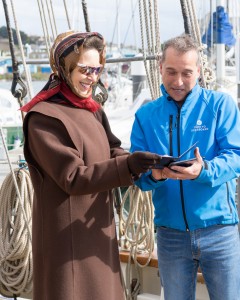How sailing round the British isles with Turn to Starboard helped former Royal Marine Dan Fielding find a new purpose for his life.
After he had been medically discharged from the Royal Marines in 2008, Dan Fielding was reaching the depths of despair. “I just wasn’t sure what to do with my life and I just drifted around. It wasn’t long before I started having real problems with my mental health and ended up in treatment,” says Dan, 36. An advisor from the Royal Marines suggested he contact Turn to Starboard, a sailing organisation based in Falmouth in Cornwall.
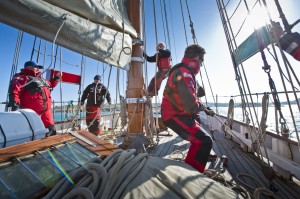 “Although I had been sailing a couple of times before, my knowledge was limited and I had no sailing qualifications, but I went along for a chat,” says Dan. “When I arrived all the team were really friendly and encouraging so I ended up signing up for the charity’s Zero to Hero programme. The 16-week course is free and designed to build confidence and teach military veterans how to sail. It covered sail training, engine maintenance and first aid, along with navigation and VHF radio operation. I found that sailing is similar to the ethos of Armed Forces life in that it needs everyone to work as a team, so I kind of felt at home.”
“Although I had been sailing a couple of times before, my knowledge was limited and I had no sailing qualifications, but I went along for a chat,” says Dan. “When I arrived all the team were really friendly and encouraging so I ended up signing up for the charity’s Zero to Hero programme. The 16-week course is free and designed to build confidence and teach military veterans how to sail. It covered sail training, engine maintenance and first aid, along with navigation and VHF radio operation. I found that sailing is similar to the ethos of Armed Forces life in that it needs everyone to work as a team, so I kind of felt at home.”
Seven months later Dan was awarded his Yachtmaster and Cruising Instructor qualification and stayed on with the charity as a full-time volunteer. In recognition of his achievement, father-of-two Dan was asked to take part as First Mate in a 2,000-mile sailing expedition around the British Isles. He joined 38 other veterans – many with little or no sailing experience – on the Turn to Starboard Round Britain Challenge to raise awareness of the challenges veterans can face after they have left the military.
The 8-week voyage set sail from Falmouth in June on the Spirit of Falmouth, a 92ft (28m) gaff-rigged schooner donated to the charity by The Prince’s Trust. Nine of the 38 veterans sailed the whole expedition whilst the rest joined for shorter sections of the voyage. The schooner was also joined by two support yachts along with a documentary film crew.
“The main aim of the Round Britain Challenge is to help participants re-engage, reintegrate and gain new skills,” explains Dan.
“Many of the crew, both male and female, have overcome significant challenges of their own since leaving the military, with some showing tremendous courage just to get on the water. Some people took part to gain sailing miles as part of their training for Yachtmaster qualifications, whereas others set themselves a personal challenge as they battle with their own issues after Service life. The trip was planned to help the crew readjust by spending time in the company of those who have experienced similar conditions.”
On June 1, the crew set sail from Falmouth heading in an anti-clockwise direction around the UK. “We had a big send-off with lots of supporters and a brass band on the quay. It felt great and we all had a high expectations of the journey ahead,” says Dan.
However, within a few hours the crew ran into their first major challenge.
“Less than six miles from Falmouth the schooner suffered a mechanical problem and we had to be towed back to the harbour under the cover of darkness. After inspecting the engine we found the top end needed rebuilding, which ended up taking us nine days. It was a difficult task and I felt really disheartened for the guys that this has happened so early on, but we kept reminding ourselves this was meant to be a challenge and things don’t always go to plan when you’re on the water.”
Once the repairs were completed the boats continued on their journey along the south coast. However, two days later the crew ran into yet another problem.
“After a fantastic sail along the south coast the bearings in the gearbox went as we sailed past the Isle of Wight. This time there was no chance of fixing it with the kit we had on board so we had to spend another nine days in Yarmouth waiting for a replacement gearbox to arrive from Norway. By now the crew were deflated, not because of the gearbox but because we had we had nothing to do but sit around and wait. Also, our expedition sponsor, International Paint, had arranged a big meet and greet event for us in Newcastle for the following week and we wanted to reach them on time.”
Once the gearbox arrived and was fitted, the crew set off on a 450-mile haul straight to Newcastle. “The journey was a slog because there was little wind so we had to power most of the way there under engine. We split into three watches of three people working three hours on, three hours off followed by three hours standby. A few days later we arrived in Newcastle, a week late for the sponsor’s planned event. However, the guys from International Paint were fantastic and had rearranged everything and welcomed us with open arms.”
After spending two days at Newcastle, the three boats set sail to Wick on the East coast of Scotland.
“When we arrived at Wick there were lots of local people waiting to meet us. Even though it’s a small place they had heard about our expedition and couldn’t do enough to help us out. Someone had ordered us diesel and other people helped us to fill the water tanks while others chatted to the crew. It was great to have another warm welcome and engage with people to explain what the expedition was all about.”
For the next part of the voyage from Wick to The Orkney Islands, Dan and the crew took advice from the local harbourmaster before crossing the Pentland Firth.
“The harbourmaster told us to ignore our books and head straight for Lother Rock. We were unsure but took his advice. All the while we were heading further and further away from Orkney and were convinced the advice was incorrect and we were making a mistake. A storm was also on our heels, which added to the tension but we held our breath and our course. As the rock quickly approached our hearts were in our mouths, but at the last moment a back eddy suddenly swung us round and slid us towards the Orkneys at a speed of around seven knots. It was absolutely fantastic and confirmed the value of listening to experts with local knowledge.”
To celebrate reaching their half-way point, the schooner moored off Orkney and prepared a surprise for the support yachts that were sailing close behind.
“Once the support yachts came within range we sent a barrage of biodegradable water bombs onto their deck. However they had anticipated our attack and retaliated with a slingshot of their own and soaked us in return.”
After an overnight stop at Stornoway, celebrations subsided as the schooner suffered more mechanical issues while leaving port. A hydraulic drive attached to the gearbox had stopped working, meaning the crew had to head back to the harbour. “By now we were a well rehearsed crew and soon had the sails up,” says Dan. “We headed back into Stornoway, completed the repairs and set off again the next morning.”
Next stop was the Isle of Lewis, heading around the most northwesterly corner of mainland Britain – Cape Wrath.
“Just the name Cape Wrath sounds terrifying,” laughs Dan, “but it turned out to be crystal clear and was like sailing on glass. There was so little wind we had to switch to engine yet again, but the view was idyllic with plenty of porpoises, dolphins and whales to be seen.”
By now the expedition was back on schedule and Dan noticed his navigation confidence was beginning to grow.
“I could feel navigating at sea was beginning to come naturally without a lengthy thought process, and I had also started to take more of a back seat overseeing the crew who were now in a well-drilled routine. In the military your priorities are your weapon, your kit and then yourself, and most of us had applied these principles in a similar way – our boat, our kit and then ourselves. I also noticed the crew had begun to take ownership of certain tasks on deck. Watching these individuals blossom felt good and I could see everyone’s confidence growing each day.”
In addition to the responsibility of acting as First Mate, Dan was also charged with overseeing the crew’s health and well-being.
“With physical and mental injuries people obviously have different needs. Throughout the trip I found that I needed to ensure certain crew members needed to be in the right role with the right assistance in place, to best suit their own injury or needs.”
After a short stop on the Isle of Lewis, the vessels sailed on to Oban on the west coast of Scotland before heading to the Isle of Islay. “At Islay we had another warm welcome and a few of our crew stretched their legs with a trip to the local whisky distillery. After that we sailed to the Isle of Man where some people disembarked to take a cycle ride around the famous TT race track.”
Next the Spirit of Falmouth headed to Liverpool to star in a new exhibition, ‘In Safe Hands’, at the Merseyside Maritime Museum celebrating 250 years of the Pilotage Service. The Spirit of Falmouth was built in Liverpool in the style of pilot schooners during the 1980s, so it was great to return to the place where she was built,” says Dan. “We berthed outside the museum and held guided tours of the boat for the public. People from the press arrived for interviews and we featured on BBC TV that night which was great.”
It was here that Dan had to leave the Spirit of Falmouth and move to one of the support yachts. A family emergency had meant the skipper had to leave the expedition and Dan was asked to join as First Mate.
“Although I was disappointed to leave Spirit it was a bittersweet feeling because the support boat, a Rustler 42, was beautiful to sail. It felt smooth and graceful on the water, and easily picked up the wind.”
From Liverpool, the Spirit of Falmouth headed out into the Irish Sea while Dan and the support boats hugged the west coast round to Milford Haven in Wales. “A few of the crew weren’t feeling too well so we stayed close to shore just in case they needed to get back on shore. From Milford Haven we headed to Penzance and waited for Spirit while she sailed to the Scilly Isles for a three-day stopover as previously planned. By now we were less than 30 miles from the finish line and we were feeling a great sense of achievement for getting this far.”
The three vessels eventually reunited at the Helford River, just a few miles short of the finish line and one day ahead of the planned schedule.
“The last short leg was a beautiful beam reach to Falmouth and it was a fantastic sail in brilliant sunshine. We were circling Spirit and the crews were laughing and joking and excited to be almost home. When we reached Falmouth Harbour the welcome was overwhelming with crowds of well-wishers on the quay. I’ve travelled the world but never been welcomed home before. It felt heart-warming to be part of a bigger team.
“As we approached the harbour smaller boats came out to meet us, blowing their horns and waving hello. It was a great feeling and it felt like a huge achievement, not only for reaching the finish line but also as a huge milestone in my own personal journey with Turn to Starboard.
Although I had passed my Yachtmaster exam, I felt like I had put my trade into practice and I was finally a competent sailor. What I also remember is the happy faces of the crew, many of who may not have smiled liked that since leaving the military. They had achieved something remarkable and that alone made the whole voyage worthwhile.”
Looking back on the trip, Dan felt the expedition helped him regain his confidence and rebuild his life. “On reflection the voyage showed me that I had become a professional sailor and people had depended on my leadership skills. The expedition has shown me that I can achieve results outside of the military and now have a new career to focus on. Although I still have plenty to learn I’m in a good place and looking forward to what the future holds.”
Since returning home Dan has splashed out and purchased a 7-year-old Petrel 30, which he now lives aboard at the local marina. He was also offered a permanent job with the charity as a sailing instructor, helping to pass on his skills to veterans in similar situations.
“I was over the moon when I was offered the job full time,” he says. “Not only did the course help me to rebuild my confidence, I felt like I was finally starting to fit in to civilian life. When I was a Royal Marine I was at the top of my game, I knew what I was doing and felt valued, but when I was discharged it felt like I wasn’t any use to any one. Now I’m up there at the top again and the charity has helped me to learn new skills, forge new friendships and experience adventure. I feel very grateful for the opportunity and pleased I got in touch.”
About Turn to Starboard
Turn to Starboard is a charity using sail training to support Armed Forces personnel affected by military operations. It was created from the personal experiences of its founder, Squadron Leader (retired) Shaun Pascoe. A keen sailor, he had noticed the calming effects of the sea and began providing sailing opportunities for others. In 2012 he set up the charity to help those in similar situations.
“There is something really quite special about sailing,” says Shaun. “It can provide a therapeutic and calming effect and when you’re out at sea there is nothing to trigger the unwelcome memories that are associated with past traumatic experiences.”
The charity’s support does not just stop at the individual. They also offer skippered sailing trips to Service families affected by military operations, with trips along the picturesque Cornish coast and to the Isles of Scilly.
To find out more, call 01326 314262 or visit www.turntostarboard.co.uk for training opportunities.



